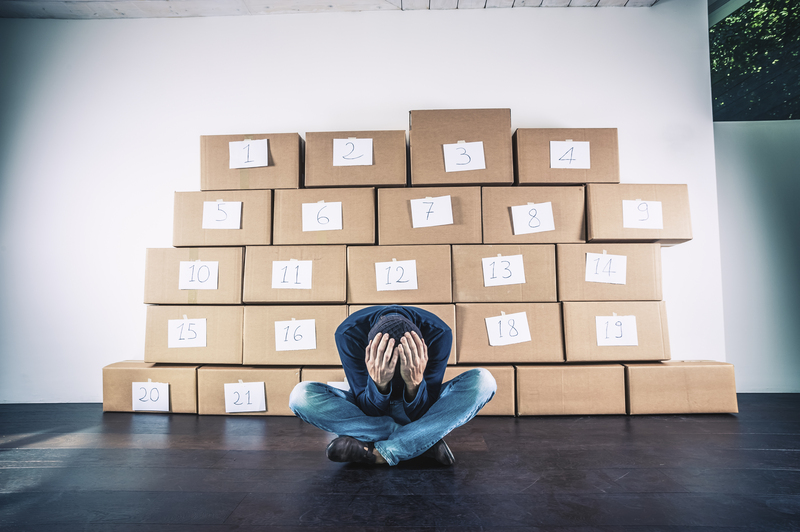How to Organize a Move Without the Stress Overload
Moving can be an overwhelming process, but it doesn't have to be synonymous with stress and chaos. With proper planning and the right approach, you can organize your move efficiently and keep overwhelm at bay. In this comprehensive guide, you'll discover actionable strategies and expert tips on how to coordinate your move without succumbing to stress overload.
Why is Moving Often Stressful?
Before diving into solutions, it's crucial to understand why the mere thought of moving homes or offices fills us with anxiety. Moving often entails:
- Major lifestyle changes - Adapting to a new environment can be emotionally taxing.
- Packing and sorting - Deciding what stays and what goes can be mentally exhausting.
- Logistical challenges - Coordinating dates, transportation, and helpers is time-consuming.
- Unexpected costs - Expenses can quickly spiral out of control if not planned carefully.
However, with a proactive mindset and a step-by-step plan, you can organize a move without the stress overload and even enjoy the transition.

Step-by-Step Guide to Stress-Free Moving
1. Start Planning Early
The cornerstone of a stress-free move is early planning. Begin by setting your moving date at least 6-8 weeks in advance. This head start gives you sufficient time to tackle every aspect in manageable chunks instead of racing against the clock.
- Mark your calendar: Circle your moving date and work backwards to create a timeline.
- Create a master moving checklist: Use online templates or apps to outline tasks week-by-week.
- Book services early: If you're hiring professional movers, book them as soon as the date is confirmed to avoid last-minute hassles.
Early organization lays the groundwork for a less stressful move and helps you handle unexpected issues smoothly.
2. Declutter Ruthlessly
One of the most effective ways to minimize moving stress is to lighten your load. Moving is the perfect time to sort through belongings and let go of what you no longer need.
- Sort room by room: Begin with areas you use least often.
- Set aside donation and disposal boxes: Separate items into 'keep,' 'donate,' 'sell,' and 'discard' categories.
- Organize a garage sale: Turn unwanted items into extra cash before moving.
Pro Tip: Fewer belongings mean less packing, less hauling, and a much simpler unpacking process at your new home.
3. Gather Quality Packing Supplies
Don't skimp on packing materials. Using the right supplies is key to protecting your possessions and avoiding last-minute emergencies such as running out of boxes or tape.
- Sturdy moving boxes in various sizes
- Bubble wrap and packing paper
- Quality packing tape
- Labels and markers for clear identification
- Plastic bins for fragile or valuable items
Keep a dedicated station with all your supplies so that packing remains organized and efficient.
4. Label Everything Clearly
Unlabeled boxes can cause confusion and increase stress when unpacking. Make labeling a standard part of your packing process:
- Use a color-coding system: Assign a color to each room and mark boxes accordingly.
- List contents on each box: Write a brief description of what's inside (e.g., 'Kitchen - Pots & Pans').
- Mark fragile items: Clearly indicate which boxes contain breakables to ensure careful handling.
This simple step saves considerable time and stress during your move-in phase.
5. Develop a Strategic Packing Plan
Avoid packing everything at once or haphazardly. Instead, make a strategic packing plan:
- Start with items you use least (off-season clothes, holiday decor)
- Pack room-by-room to stay organized
- Leave daily essentials for last, such as toiletries and kitchenware
Packing incrementally prevents burnout and ensures essential items remain accessible until moving day.
Choosing Between DIY Moving vs. Professional Movers
One of the most significant decisions in stress-free moving is whether to go DIY or hire professional movers. Each route has its pros and cons:
DIY Move:
- Cost-effective for smaller moves
- Full control over the process
- Requires friends/family support and equipment rentals
Professional Movers:
- Saves time and physical effort
- Insured and professionally handled
- Higher upfront cost
Tip: For long-distance or large-scale moves, a moving company is often worth the investment for peace of mind and efficiency.
Managing the Emotional Side of Moving
Organizing a move is not just about logistics. Handling the emotional impact of moving--especially if you're leaving a long-time home or community--is equally important for minimizing stress.
- Honor your feelings: Take photos, have a farewell gathering, or write a letter to your old home.
- Stay connected: Exchange contact info with neighbors and friends; schedule future visits or virtual catch-ups.
- Embrace your new start: Make a list of things to look forward to in your new area.
Addressing the psychological aspects helps you transition positively and reduces anxiety.
Ensuring a Smooth Moving Day
Pack an Essentials Bag
Prepare a dedicated box or suitcase with items you'll need right away. This "open-first" box should include:
- Toiletries and medications
- Chargers and important electronics
- Snacks and drinks
- Fresh clothes and bed linens
- Basic kitchenwares (coffee maker, utensils)
Having these items within easy reach reduces stress on moving day and helps you feel settled quickly.
Assign Roles and Stay Coordinated
Whether you're moving with family or hired help, assign specific roles for move day. For example:
- One person handles checklists and inventory
- Another oversees the movers and directs box placement
- Someone else manages pets or children during the process
This keeps the move running efficiently and prevents confusion or miscommunication.
Take Breaks and Hydrate
Moving day can be physically draining. Schedule mini breaks, provide water, and have light snacks on hand. Small pauses throughout the day help maintain energy and boost morale.
Unpacking and Settling In: Organization After the Move
Organizing your new home is just as important for minimizing stress after the move. Prioritize:
Unpack in Order of Importance
- Start with essentials: Kitchen, bathrooms, and bedrooms come first.
- Focus on one room at a time: This method keeps the process tidy and less overwhelming.
- Set up key furniture before unpacking small items: Beds, couches, and tables provide structure and reduce visual clutter.
Use Organizational Tools
Maximize your new space with storage bins, closet organizers, and shelving units. Proper organization from the get-go prevents clutter from building up and eases your transition.
Get to Know Your New Area
Take breaks from unpacking to explore your neighborhood. Locate nearby grocery stores, parks, healthcare providers, and other amenities. This will help you feel oriented and at home faster.
Pro Tips for Organizing a Move Without Overwhelm
- Digitize important documents before moving to avoid losing paperwork.
- Notify change of address with banks, subscriptions, and the postal service ahead of time.
- Schedule utility disconnections and reconnections at your old and new address to ensure a smooth transition.
- Consider moving insurance for valuable or irreplaceable items.
- Keep a positive attitude and make time for self-care during the process.

Frequently Asked Questions About Stress-Free Moving
How do I stay organized during a move?
Staying organized involves creating detailed lists, labeling everything, and systematically breaking down tasks week-by-week. Consider using moving apps or digital tools to keep everything accessible and on track.
How can I involve children and pets in the moving process?
Assign children age-appropriate packing tasks or let them decorate their moving boxes. For pets, keep routines as normal as possible and arrange a safe, quiet space during moving day.
What is the best way to manage moving costs?
Get quotes from multiple moving companies, plan ahead to take advantage of off-peak rates, and save money by decluttering before moving. Track expenses in a dedicated journal or spreadsheet for better financial control.
How can I prevent last-minute moving emergencies?
Avoid emergencies by preparing a backup plan for transportation, keeping essential supplies at hand, and consciously pacing your workload. Confirm all reservations and arrangements a few days before moving day.
Conclusion: Embrace Your Move With Confidence
Moving doesn't have to mean chaos and anxiety. When you organize your move without the stress overload, you position yourself to start your next chapter positively and efficiently. Remember to plan ahead, declutter, pack smart, and take breaks as needed. Whether moving across town or across the country, the right mindset and organization are your best tools for a smooth, stress-free move.
Start today by outlining your steps, gathering supplies, and embracing the excitement of new beginnings. Happy moving!



